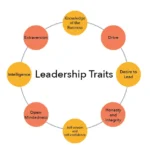Directional leadership styles define the strategic paths managers use to guide employees toward achieving results. These styles typically fall into two core categories: task-oriented and relationship-oriented leadership. While often discussed separately, successful leaders frequently adopt a collaborative leadership approach that blends both styles.
Task-Oriented (Objective-Oriented) Leadership Style
In the task-oriented leadership style, the manager focuses on performance outcomes and operational efficiency. Key characteristics include:
-
Applying performance pressure to increase output
-
Enforcing deadlines to ensure timely delivery
-
Maintaining strict control to avoid workflow disruptions
-
Emphasizing heavy workloads to meet targets
-
Reprimanding mistakes to minimize errors
This style is highly results-driven and is effective in deadline-sensitive or high-performance environments. However, overuse may lead to stress or reduced morale.
Relationship-Oriented (Person-Oriented) Leadership Style
The relationship-oriented leadership style emphasizes interpersonal dynamics and team cohesion. Leaders using this approach typically:
-
Treat employees as partners to foster collaboration
-
Build strong personal relationships to avoid hierarchy barriers
-
Remain approachable to encourage open communication
-
Show loyalty to earn trust and commitment
-
Offer recognition to sustain or improve performance
This style fosters a positive work culture and can improve long-term retention and employee engagement.
Integrating Both Styles
While these leadership styles are conceptually distinct, effective managers often blend both. The most successful leaders apply the necessary performance pressure while being valued and respected by their teams. This balance is central to models like the Behavioral Grid of Leadership and Three-Dimensional Leadership Theories, which emphasize the synergy of task- and person-related behaviors.
« Back to Glossary Index





![15 Employee Offboarding Templates That Save Hours of HR Time [Free Downloads] 15 Employee Offboarding Templates That Save Hours of HR Time [Free Downloads]](https://i1.wp.com/www.hrcloud.com/hubfs/Header.png?w=150&resize=150,100&ssl=1)
